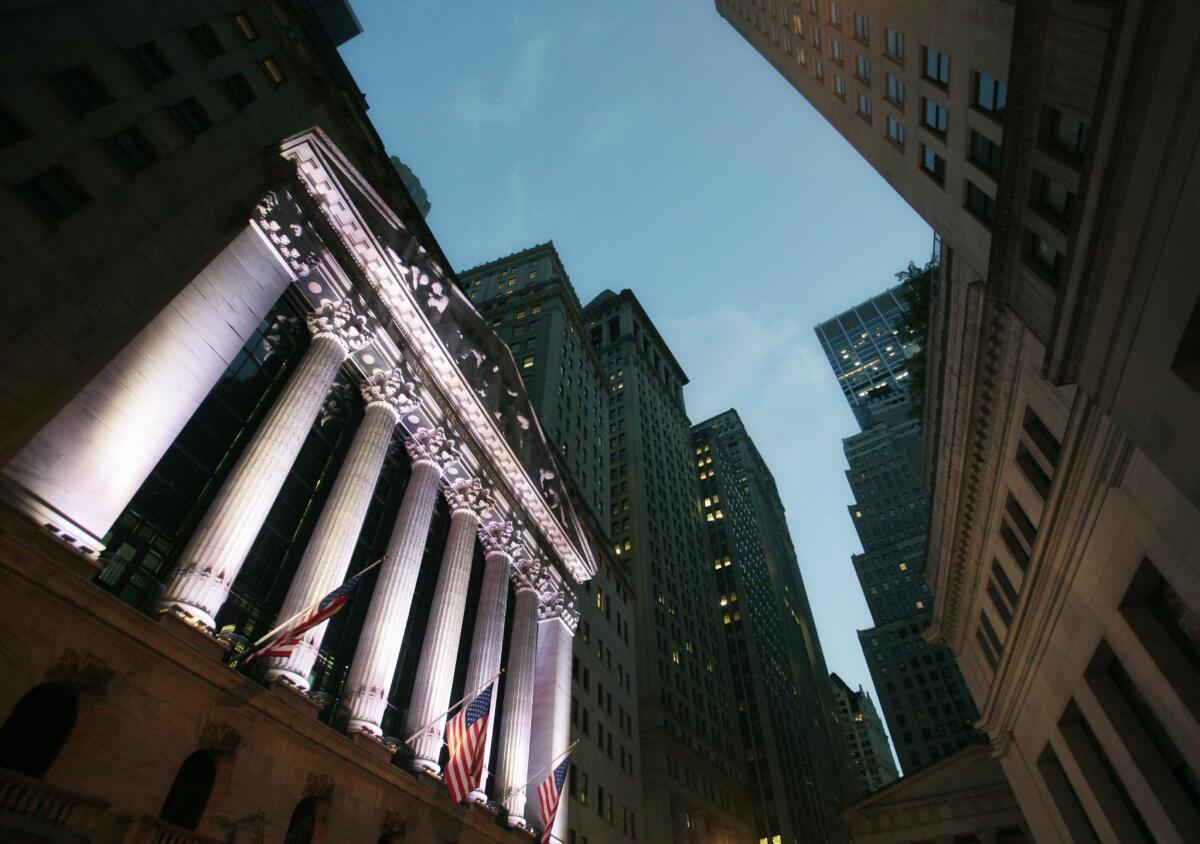Stocks inch higher as banks rise and drugmakers fall

U.S. stocks gave up large gains and finished barely higher Friday. Banks and technology companies traded higher, while stocks that pay large dividends fell thanks to a jump in bond yields.
Stocks were on track for large gains early in the day as reports showed consumers in both the U.S. and China appeared to be spending more. Banks rose after JPMorgan Chase and Citigroup disclosed solid quarterly results. But the gains faded as the day wore on. Drug company stocks continued to fall and energy companies slipped.
“The retail sales numbers on the surface looked pretty good, but when you dig into them, they were not that great,” said Mike Baele, managing director at U.S. Bank’s Private Client Reserve. “It seems like every good report we get, we get an offsetting weaker report.”
Read more: Retail sales grow in September as consumer confidence edges up »
The Dow Jones industrial average, which had jumped as much as 162 points in the morning, finished up 39.44 points, or 0.2%, at 18,138.38. The Standard & Poor’s 500 inched up 0.43 of a point to 2,132.98. The Nasdaq composite rose 0.83 of a point to 5,214.16.
Goldman Sachs was responsible for most of the Dow’s gains. It rose 1.9% to $170.52 after Britain’s High Court threw out a $1-billion lawsuit against the company. Libya’s sovereign wealth fund had accused Goldman Sachs of duping the fund into making risky deals.
Bond prices fell. The yield on the 10-year Treasury note rose to 1.80%, from 1.75%. Higher bond yields also help banks because they lead to higher interest rates on loans, and that enables banks to make bigger profits from lending.
JPMorgan Chase and Citigroup reported results that were better than investors expected. The reports may have raised investor hopes for companies that will post results next week, such as Morgan Stanley, Charles Schwab and BlackRock.
“It was a good kickoff to earnings season” for banks, Baele said. “It was actually some decent revenue as well with both investment banking and trading.”
Rising bond yields attracted investors’ attention, and as a result, they sold utilities, real estate investment trusts and other stocks that pay large dividends. Those dividends are more appealing to investors seeking income when bond yields are low. PG&E fell 0.9% to $59.80, and Duke Energy slid 0.9% to $77.21.
Reports suggested that consumers in China are starting to spend more, which helped technology companies recover some of Thursday’s losses. Microsoft rose 0.9% to $57.42, Apple ticked up 0.6% to $117.66, and Intel climbed 1.3% to $37.45.
Twitter slid 5.1% to $16.88 after Salesforce.com told the Financial Times it isn’t interested in buying the company. Twitter has lost 32% of its value since Oct. 5 on reports that potential buyers were not going to make offers. Salesforce investors were not enthusiastic about the potential offer, and its stock jumped 5.2% to $74.27.
Read more: Salesforce rules out bidding on Twitter »
While retail spending rose, the Commerce Department’s report also showed that spending at department stores decreased in September as consumers continued to do more of their shopping online. Kohl’s shares fell 3.2% to $43.68, and Macy’s sank 3.3% to $35.57.
HP sank 4.4% to $14.48 after the computer and printer maker said it will cut jobs as demand for those products continues to fall.
Read more: HP plans to cut 3,000 to 4,000 jobs over the next three years »
U.S. crude oil slipped 9 cents to $50.35 a barrel. Brent crude, the international standard, fell 8 cents to $51.95 a barrel. That sent energy companies lower.
Healthcare stocks, which are by far the worst-performing industry on the S&P 500 this year, continued to slip. EpiPen maker Mylan tumbled 3.7% and closed at a three-year low of $36.49. Cancer drug maker Celgene sank 2.1% to $98.50.
In other energy trading, wholesale gasoline rose 1 cent to $1.49 a gallon. Heating oil fell 1 cent to $1.57 a gallon. Natural gas slumped 6 cents, or 1.7%, to $3.29 per 1,000 cubic feet.
Gold fell $2.10 to $1,255.50 an ounce. Silver lost 2 cents to $17.44 an ounce. Copper slipped 1 cent to $2.11 a pound.
The dollar rose to 104.18 yen, from 103.60 yen. The euro rose to $1.0983, from $1.1053.
France’s CAC 40 jumped 1.5% and Germany’s DAX rose 1.6%. In Britain, the FTSE 100 advanced 0.5%. Japan’s benchmark Nikkei 225 index went up 0.5%, and South Korea’s Kospi increased 0.4%. Hong Kong’s Hang Seng rose 0.9%. Thailand’s SET index climbed 4.7% in the second day of trading after the death of Thailand’s king. The SET fell 4% in September as investors worried about the monarch’s health, and even with the rally Friday, the index fell 1.8% this week.
Read more: Thailand begins a year of mourning after the death of its beloved king »
UPDATES:
2:05 p.m.: This article has been updated with closing prices, analysis and additional background information.
7:45 a.m.: This article has been updated with more recent market information.
This article was originally published at 6:50 a.m.
More to Read
Inside the business of entertainment
The Wide Shot brings you news, analysis and insights on everything from streaming wars to production — and what it all means for the future.
You may occasionally receive promotional content from the Los Angeles Times.










